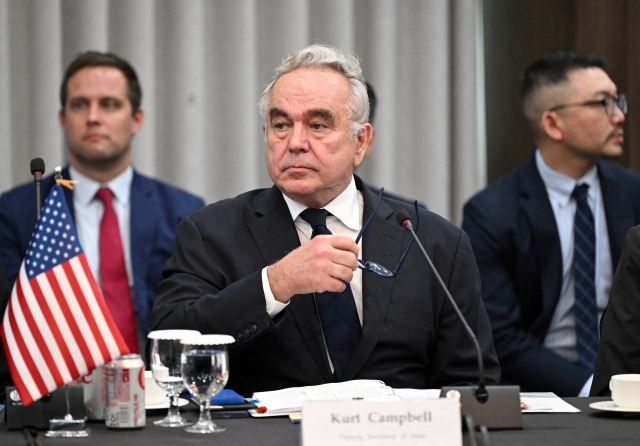In rare move, US directly criticizes Yoon for his martial law declaration
By Ji Da-gyumPublished : Dec. 5, 2024 - 15:28

Key Biden administration officials voiced bewilderment and sharp criticism over President Yoon Suk Yeol's sudden martial law declaration late Tuesday night, which they learned about only via television, raising serious concerns about democratic backsliding by Yoon, who was once praised as a host of the US-initiated Summit for Democracy.
US Deputy Secretary of State Kurt Campbell issued an uncharacteristically sharp rebuke of Yoon, condemning his declaration of martial law as "badly misjudged," "deeply problematic," and "deeply illegitimate" — a rare display of direct criticism in diplomatic relations.
"What transpired over the last 24 hours in South Korea, in the ROK, was completely, deeply unpredictable and unlikely, and I think President Yoon badly misjudged," Campbell remarked during the Aspen Security Forum on Wednesday, referring to South Korea by its official name, the Republic of Korea.
"And I think the memory of previous experiences of martial law have a deep and negative resonance in South Korea," he stressed.
However, Campbell expressed confidence in the strength and resilience of South Korea's democracy, emphasizing that it is something deserving of deep reflection.
"This is a powerful symbol in the fact that people were prepared to come out and make clear that this was a deeply illegitimate process, and that would be met by the will of the people and frankly, the will of the legislative bodies," Campbell said. "I think we have to take some comfort and confidence in that."
Campbell noted that Yoon's declaration of martial law was inexcusable despite the mounting political pressures he faces, saying, "Politics in the ROK are deeply polarized and divided."
"I will also say that, like the toughness of politics in the ROK, it probably has taken a toll. This has been very tough over the course of the last year, with lots of challenges, lots of moves on impeachment, and lots of questions about the activities of the president and his wife," Campbell said.
"That is not in any way meant to be an excuse, but it gives you a sense of some of the pressures that are being faced."
Campbell also noted that nearly all interlocutors within the Yoon government -- including the foreign minister, finance minister and key officials in the president's office -- were "themselves deeply surprised by this."
"We have good insights into a variety of things. But in global politics, there are always going to be situations where there are developments that are unforeseen."
South Korea's Foreign Ministry suggested ongoing discussions between Seoul and Washington at a ministerial level regarding President Yoon Suk Yeol's martial law decree.
During a closed-door briefing, a ministry official addressed questions about the Ministry's response to Campbell's rare criticism of the ally's leader, stating, "Necessary communication is being conducted at various levels between South Korea and the United States."
When pressed on whether these communications included discussions at the foreign minister level, the official replied, "I cannot confirm that, but I cannot deny it either."
National Security Advisor Jake Sullivan publicly acknowledged that the US was left entirely in the dark about Yoon's declaration of martial law, stating that "we were not consulted in any way. We learned about this from the announcement on television the same way the rest of the world did."
Sullivan also predicted that "to-ing and fro-ing between the main parties in Korea" would continue following what he described as "this rather dramatic announcement that raised alarm bells everywhere," including in Washington.
"What we want to see is just the proper functioning of the democratic institutions of the ROK," Sullivan said during an event hosted by CSIS in Washington on Wednesday.
“South Korea's democracy is robust and resilient and we're going to continue to speak out publicly and engage privately with South Korean counterparts to reinforce the importance of that continuing as we go forward," he added.
US Secretary of State Antony Blinken indirectly addressed the implications of Yoon's declaration of martial law during a press briefing at NATO Headquarters in Brussels on Wednesday, emphasizing the importance of South Korean democracy and its powerful story, which the US values highly and seeks to sustain.
Blinken reminded the press that South Korea was the host country of the third Summit for Democracy, an initiative started by the Biden administration. South Korea was the first country outside of the US to host the summit independently.
Blinken underscored, "In our judgment, any political disagreements need to be resolved peacefully and in accordance with the rule of law."


















![[Today’s K-pop] BTS' Jimin extends record streak on Billboard Hot 100](http://res.heraldm.com/phpwas/restmb_idxmake.php?idx=642&simg=/content/image/2024/12/11/20241211050082_0.jpg&u=20241211173247)